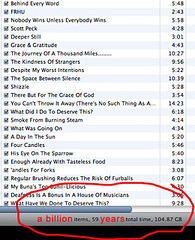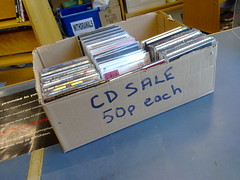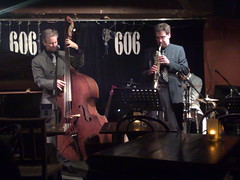This is just a quick post to throw an idea out there that we’ve been chatting about on Twitter this evening. I mentioned a short while ago something I’ve been thinking about for a while – the idea of only selling CDs in pairs – “keep one share one” – thinking of it as a way of making ‘promo copies’ count… Continue reading ““Keep One Share One” – Selling CDs in Pairs.”
And Nothing But The Bass Is 10 Years Old Today.
10 years ago today, I received a shipment of CDs from ICC duplication, to the Greenbelt Festival in Cheltenham – it was my first solo album, And Nothing But The Bass, and the start of my solo recording career.
Here it is – please download it for free:
10 years on, and I’m less than 24 hours into the life of a brand new album, Slow Food, with Trip Wamsley. It’s been such an amazing journey, not least of all because what seemed like such a weird thing to do back then – to me and to everyone else – is now so normal. The internet is awash with people experimenting with solo bass, and looping crops up everywhere from coffee-shops to the top of the charts.
The gimmick potential diminished many years ago, for which I’m most grateful. It let me get on with making the music that mattered to me, via the method that made most sense.
Solo bass was never a circus trick for me.
I was never interested in looping as a way of showing how clever I could be.
It was a way of me getting the music inside my head out to the world.
I hear things in layers, I hear evolving texture not rock drums and last-chorus-key-changes.
The template is still much the same. I’m just much better at it. The vision is more refined, the tech is better (thank the baby Jesus for Bob Amstadt and the Looperlative) and yes, I’m orders of magnitude more developed as a musician – technically, theoretically, conceptually, melodically… I just make better music happen. At least, I make music happen that is ever-closer to the soundtrack to the inside of my head. And I’m still loving it.
I’m loving the collaborations this has all led me to – the albums with Jez Carr, Theo Travis, Lawson Dodds Wood, Mike Outram and now Trip Wamsley. The gigs with Lobelia, Michael Manring, BJ Cole, Cleveland Watkiss, Julie McKee… The myriad incredible musical moments of the Recycle Collective at Darbucka, The Vortex and Greenbelt.
And I’m grateful to every journalist that’s ever taken the time to listen to and write about the music, every radio DJ that’s ever played it, and every person who has played a CD to their friends and said ‘check this out’, or emailed them a link, burned a CDR for them, emailed them some tracks. It’s all great, and I thank you for it.
So, 10 years on, here’s the new album: Have a listen, enjoy, pay whatever you think its worth. For me, the last 10 years have been priceless.
What’s A Download Worth? Part 1 – The MASSIVE Downloader…
 Following on from the BPI and their mad statistic that £200 MILLION is lost in UK music revenue due to ‘illegal downloading’, (their head of public affairs attempted to defend the notion, based on ‘research’ they’d done at the all party meeting last week. Balls.) I thought it’d be worth talking about what a download is worth.
Following on from the BPI and their mad statistic that £200 MILLION is lost in UK music revenue due to ‘illegal downloading’, (their head of public affairs attempted to defend the notion, based on ‘research’ they’d done at the all party meeting last week. Balls.) I thought it’d be worth talking about what a download is worth.
Because, clearly, a collection of bytes on a harddrive isn’t, in and of itself, worth anything. It’s also not ‘taken’ from a central repository of bytes that gets smaller as it is dipped into. In fact, every time a new person downloads it, more ‘product’ is able to exist. If bands were in a situation where for every CD they gave away, they were given another 2 CDs to give away, they’d give everything away, because CD ownership is a tangible, measurable thing, and having 100,000 CDs out there, and not have lost a penny to make it happen, would be awesome.
But why would a CD be worth more than a download? Let’s keep going… Continue reading “What’s A Download Worth? Part 1 – The MASSIVE Downloader…”
“Sharing Is Not Stealing” – Cost, Value And The Desire To Share.
 A few thoughts on the relationship between cost, value and the action of sharing music:
A few thoughts on the relationship between cost, value and the action of sharing music:
As I’ve said before, £10 was never representative of the real value in an album. It was less than the value of the time the person takes to listen to it, and certainly not anything like the value the artist places on their finished work.
And of course, given that all albums sell in different amounts, and all the cost of making the album is upfront – before anyone knows how many it’s going to sell – it couldn’t really be described in any fractional way as a share of that value.
No, it wasn’t an expression of ‘value’, largely because the most natural way of expressing our sense of value in music is to share it. Continue reading ““Sharing Is Not Stealing” – Cost, Value And The Desire To Share.”
How DO Musicians Earn Online?
 Social web has been buzzing these last couple of days with a visualisation by Information Is Beautiful, entitled “How Much Do Musicians Earn Online?†Click here to see it.
Social web has been buzzing these last couple of days with a visualisation by Information Is Beautiful, entitled “How Much Do Musicians Earn Online?†Click here to see it.
In case you’re not able to see the list, it’s a visual representation of how many instances of a range of online ‘music payment events’ you’d require to make a living wage solely from that service.
Not surprisingly, streaming services come out of it badly, especially when compared to sales of CDs.
However, the problem with presenting data in this way is that implicit within the list itself is the assumption of linearity: the list itself says “these are distinct events between which there is at least conceptual parity when comparing how many instances of that payment event are required to meet a particular sum.†Continue reading “How DO Musicians Earn Online?”
A Decade In Music: The Internet And Me
 I was on the internet before my first album came out (this is what it looked like back then). In fact, much of the momentum that my first album had was to do with my good standing in the various bass-related web communities that I was a part of. As a player, teacher and journalist, I had a bit of a profile, and the web was a MUCH smaller place in the late 90s.
I was on the internet before my first album came out (this is what it looked like back then). In fact, much of the momentum that my first album had was to do with my good standing in the various bass-related web communities that I was a part of. As a player, teacher and journalist, I had a bit of a profile, and the web was a MUCH smaller place in the late 90s.
And that all made it so much easier to decide to do my album completely on my own. I never even entertained the idea of trying to get a ‘deal’. The economics didn’t make sense even then, and I had a hunch that the future was indie… Continue reading “A Decade In Music: The Internet And Me”
Independent Music Manifesto
I was asked to write a piece for Agit8.org.uk about ‘The Future Of The Music Industry‘. It was a nice chance to pull together a lot of thoughts, which, given that we’ve no idea quite how the future is going to pan out, are actually all about where we’re at now. A state of the indie nation address, if you will. So here it is. Enjoy, it’s a pretty good summary of where my thinking is at just now.
-o0o-
 Major label collapse, 360 deals, Pirate Bay, Spotify, Bit Torrent, Youtube… It’s clear to anyone with half an eye on the news that something huge is happening in the world of music. And if you believe the majority of the press, it’s universally a bad thing – lots of very sad multi-millionaires are seeing their scarcity cash-cow sacrificed on the alter of ubiquity.
Major label collapse, 360 deals, Pirate Bay, Spotify, Bit Torrent, Youtube… It’s clear to anyone with half an eye on the news that something huge is happening in the world of music. And if you believe the majority of the press, it’s universally a bad thing – lots of very sad multi-millionaires are seeing their scarcity cash-cow sacrificed on the alter of ubiquity.
However, the problem is not actually with the music industry, but with the CD selling industry. There’s an old saying, ‘when all that you have is a hammer, everything looks like a nail’ – if your entire view of what being ‘in music’ is about is shifting CDs, then indeed, the future of the CD selling business looks pretty bleak. Continue reading “Independent Music Manifesto”
Promotion Is A Numbers Game (Get Heard!)
 I’ve run across a few situations recently where people have been limiting the amount of their music that can be heard online. So here’s a few thoughts about free streaming music, and the business model involved:
I’ve run across a few situations recently where people have been limiting the amount of their music that can be heard online. So here’s a few thoughts about free streaming music, and the business model involved:
Most of the research I’ve seen – as well as the conversations I’ve had – tell us that a reasonable percentage of people still buy CDs. They still want music on CD, and are going to buy the music they like.
Nothing that I’ve seen or heard tells me that music fans will pay money for a CD in order to hear music they’re restricted from hearing online – just so they can find out if it’s good or not – or that people who buy CDs are happy to sit and click ‘play’ over and over again on last.fm instead of buying music… Continue reading “Promotion Is A Numbers Game (Get Heard!)”
After CDs. What’s next?
 Following on from yesterday’s post about the anachronistic nature of the term ‘label’, I’ve been having a think about the actual format that music is released in.
Following on from yesterday’s post about the anachronistic nature of the term ‘label’, I’ve been having a think about the actual format that music is released in.
It’s amazing how containers can make us lazy about content. The assumptions we make about the nature of music, collections of music, what constitutes a ‘complete work’ etc.
There’s a great thread over on solobasssteve.com about this, where Tom asks about the way that downloads are allowing classical music to be consumed in the way it was intended – in mixed programmes of individual movements, or of complete works without the weird filler stuff that’s used to make up the empty bit on the CD. Continue reading “After CDs. What’s next?”
Open Letter To the UK Jazz Community, Pt II – do more recordings!
 So, as I said in Part 1, the UK jazz scene is producing some outstanding music, but
So, as I said in Part 1, the UK jazz scene is producing some outstanding music, but
- Doesn’t seem to appreciate itself and
- Doesn’t seem to have done much thinking about its future or even its place in the ‘present of music’.
I suppose I ought to define what I mean by ‘the UK jazz scene’ (should’ve done this in the first post, but still) – my thoughts here are based on conversations with a wide range of musicians, interactions with venue bookers, reading the jazz press here and talking to the people who run the labels. It’s all anecdotal, in that I’ve done no quantitative research, but the trends within my observations are pretty conclusive – the exceptions to them are there, but very rare…
Continue reading “Open Letter To the UK Jazz Community, Pt II – do more recordings!”
